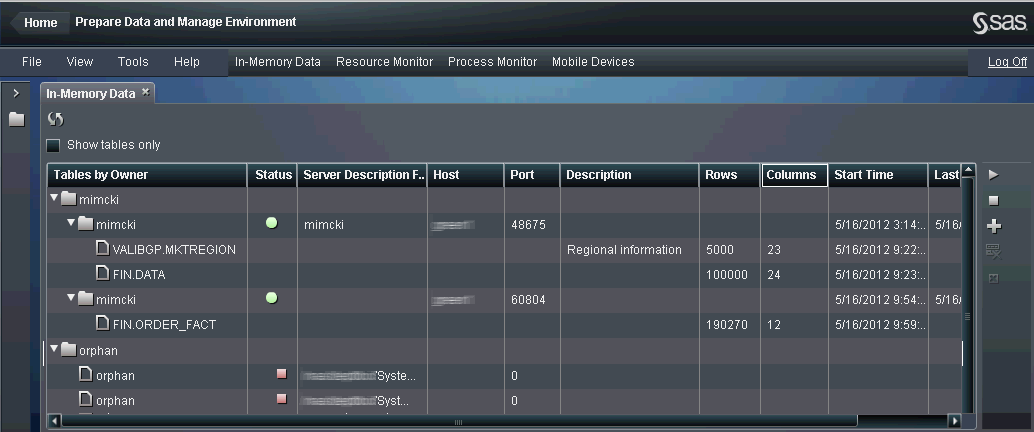What Does the In-Memory Data Tab Show?
The In-Memory
Data tab is the part
of the data preparation interface that is used for starting and stopping SAS LASR Analytic Server
instances. It is also used for loading and unloading tables to those
server instances.
Note: If the In-Memory
Data tab does not show any server instances and reports
an error, then contact your system administrator to make sure the
SAS LASR Analytic Server Monitor is running.
You can click  to have the table
display the latest information that is available from the SAS LASR Analytic Server
Monitor. You can select the Show tables only check
box to reorganize the table by table name rather than user ID and
server instance.
to have the table
display the latest information that is available from the SAS LASR Analytic Server
Monitor. You can select the Show tables only check
box to reorganize the table by table name rather than user ID and
server instance.
 to have the table
display the latest information that is available from the SAS LASR Analytic Server
Monitor. You can select the Show tables only check
box to reorganize the table by table name rather than user ID and
server instance.
to have the table
display the latest information that is available from the SAS LASR Analytic Server
Monitor. You can select the Show tables only check
box to reorganize the table by table name rather than user ID and
server instance.
The following list identifies
the fields shown in the table:
Tables by Owner
This column lists the
unique user IDs that have started server instances. You can expand
the node to view the individual server instances started by the user
ID and the tables that are loaded into memory on the server instance.
Status
The status column is
used to provide a graphical representation of the status for a server
instance.
The following icons
are used in the status column:
-
 indicates that the server instance is stopped. These
servers were not stopped manually, but ran until they reach the maximum
run time. These items are grouped under the orphan user
ID to represent that the server instance is not running. For more information,
see Orphan Server Description Files.
indicates that the server instance is stopped. These
servers were not stopped manually, but ran until they reach the maximum
run time. These items are grouped under the orphan user
ID to represent that the server instance is not running. For more information,
see Orphan Server Description Files.
Server Description File
For
servers that are in a ready state, this field shows the server description
file name. For servers that are listed under the orphan user
ID, this field lists the fully qualified path to the server description
file.
Host
This
field specifies the host name for the machine that is used as the SAS LASR Analytic Server
root node.
Description
This field specifies
the table description. This description is visible in the explorer
interface when users select a table to explore. Some tables do not
have a description because either a description was not stored with
the data set, or the data source does not support associating a description
with a table.


